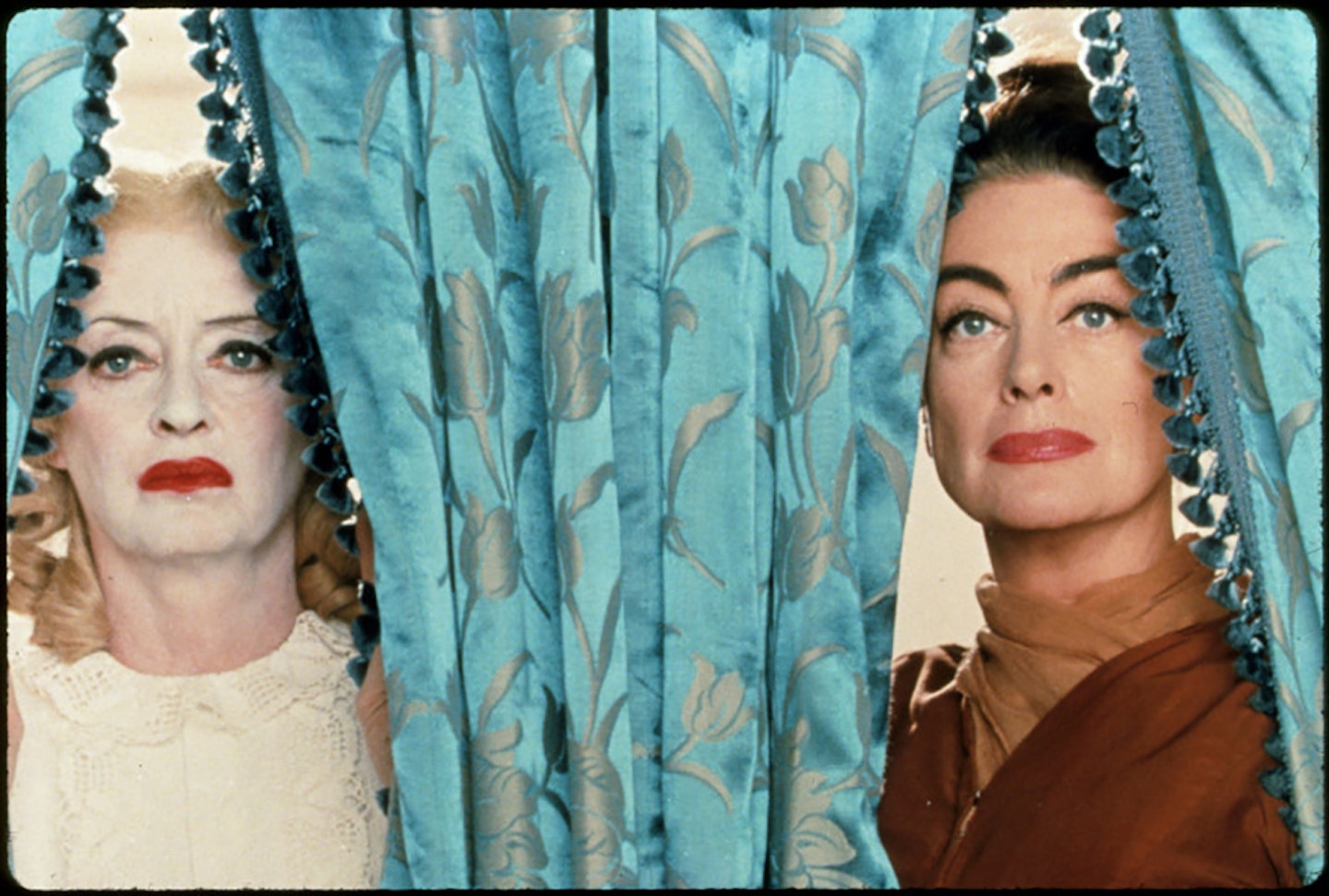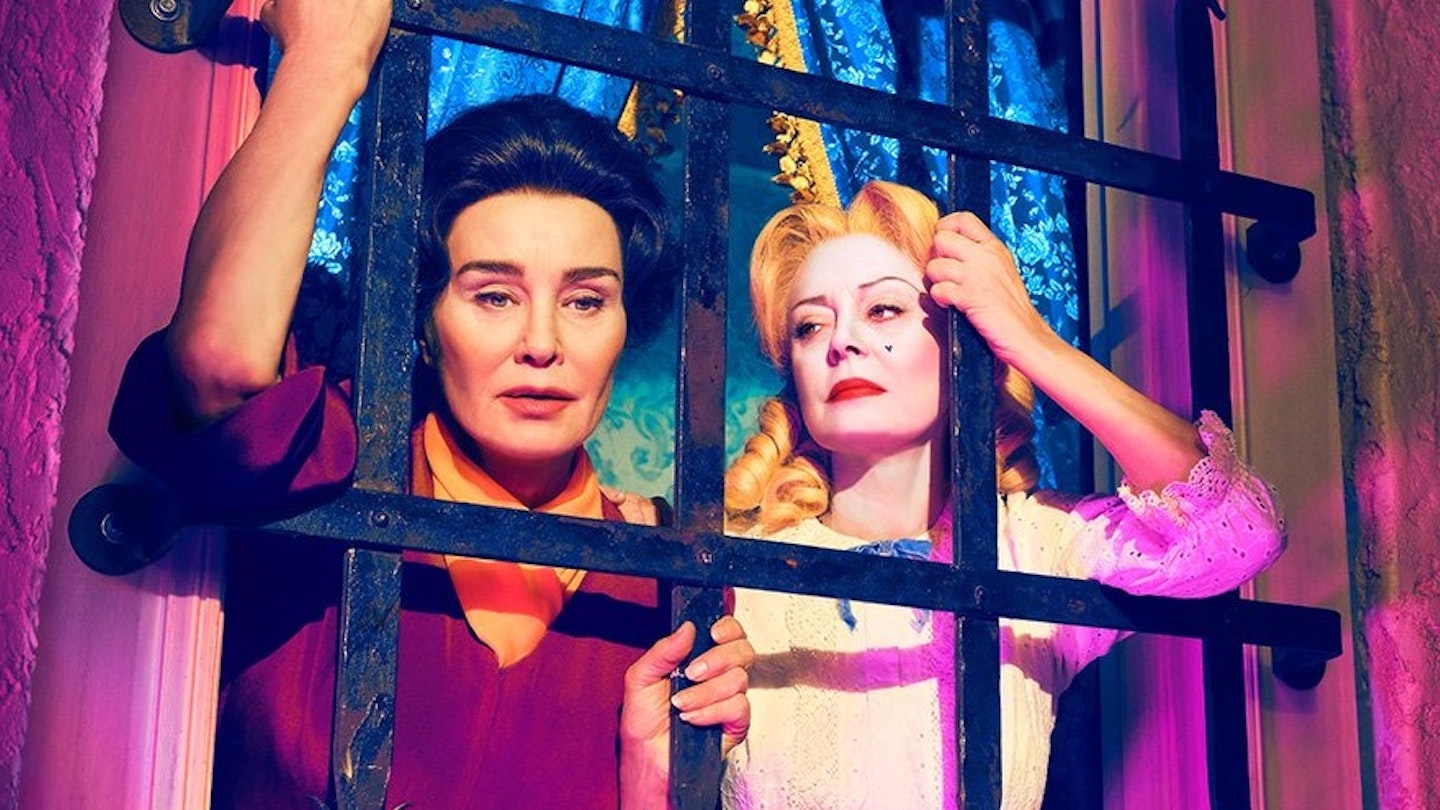Ryan Murphy's American Horror Story impacted television in a major way, not only ushering in the limited series, but also the concept of taking a troupe of actors and featuring them in entirely different roles. Now he's attempting to do it again with Feud: Bette And Joan, an eight episode exploration of Old Hollywood through the rivalry between actresses Bette Davis (Susan Sarandon) and Joan Crawford (Jessica Lange), told against the backdrop of Robert Aldrich's 1962 film What Ever Happened To Baby Jane?.
In this exclusive interview, Feud executive producer Tim Minear, whose credits include The X-Files, Angel, Firefly and American Horror Story, details the development of this series and the power of this tale of fading Hollywood legends.
What was the origin of Feud?
Ryan Murphy has always been interested in this story and, as you know, I've been working with him on American Horror Story since the first year. I've also had an obsession with Old Hollywood; I've been trying to get an Old Hollywood show off the ground for, I don't know, eight or maybe ten years. You could probably see some of that work reflected in some of the episodes of things I've done. Like the Angel episode “Are You Now Or Have You Ever Been”. So it's always been an obsession of mine.
Ryan had optioned a screenplay called Best Actress, and he was going to be doing that with Plan B, which is Dede Gardner and Brad Pitt's company. At some point he realized that instead of making a movie, this could be a limited series. And that was, of course, after he had reinvented the limited series with American Horror Story and they became the vogue thing to do on television. Now they're all over the place. But he started it. And so, when he decided to do that, he knew that was an interest of mine and he approached me about teaming up with him to do that in the off-season after Horror Story, so of course I jumped at it. It's like a dream come true.
What is it about old Hollywood that you found so fascinating?
Well, everything. I work in this business, so it's going to be something that interests me. I'm also from California, more or less. I mean, I was born in Manhattan, but I grew up out here from the time I was four. So, I live in the middle of it and it's the history that surrounds me. Beyond just loving old movies and loving the history of Hollywood, and being a classic movie buff, the history that surrounds me in Southern California has always been fascinating to me. From the silent period on. This town, Las Angeles, is a paradise that sprung up out of a desert through sheer will. And there's a lot of great stories to be told. And because it is the career that I have chosen and been lucky enough to make my living doing, I feel like all the people who came before me ... That I sort of owe it to them to tell their stories whenever I can. I know that sounds probably incredibly pretentious and self-important, but that is how I feel.
What was the appeal of this particular story?
I was a huge Bette Davis fan going into this. Not as much of a Crawford fan, but came out of it maybe even being more of a Crawford fan than I was a Davis fan. That story always interested me, and Baby Jane's always been a favorite film of mine. I love Robert Aldrich; I think he's a completely underestimated and underappreciated auteur, really. In a way, he was like Billy Wilder, right? He created films in many different genres and sort of mastered anything he put his hand to. You know, Kiss Me Deadly is considered one of the great film noirs of the fifties, but also, Whatever Happened to Baby Jane? revitalized the careers, or should've revitalized the careers, of Bette Davis and Joan Crawford, and it created a whole new genre in itself.
Did the story easily lend itself to eight episodes?
This is what's great about the idea of the limited series now — you don't have to spin your wheels for five seasons on a story. And at first, even when Ryan first reinvented the limited series through American Horror Story, every cable show was thirteen episodes. And now you don't even have to do that. You can do eight episodes, you can do ten episodes, you can do whatever amount episodes is right for the story you're telling. So, you're essentially doing an eight hour movie.
So there was enough story there. There's more than one phase to it, actually, because there's the whole backstory of Bette and Joan. And how they reigned supreme in Hollywood, one at MGM and one at Warner Brothers, in the thirties and forties. And then there's the story of them in the fities, but the story that we're telling, essentially, is the story of them in the early sixties when they finally came together to make a movie. And there's two phases to that, because after Baby Jane, there was an attempt to do a followup, which was going to be called, Whatever Happened to Cousin Charlotte, which eventually became Hush Hush Sweet Charlotte with Bette Davis, also directed by Robert Aldrich. So, there was enough story there, for sure.
What was the most intriguing aspect of this show for you?
For me, television is often a time machine. It's a way to revisit a period that you weren't around for, and it's a way to steep in the juices of a time gone by. That's fascinating to me, and it's really fascinating to me that you have the story of these two women of a certain age, and they were in their mid to late fifties when they were doing this movie. Being a woman in your mid to late fifties in 1961 is different than today, but there are a lot of parallels between how women are viewed and how woman are treated and how society manipulates or exploits, and how people are complicit in their own tragic downfalls ... There's just a lot there.
How much of this is real and how much of this is elaborated on, shall we say, for television?
I don't think there's really anything in our telling of the story that could not have happened. We used the facts and everything in our story is true. Of course one has to fictionalize and imagine how certain conversations may have gone between people when you're not privy to them. At the same time, a lot of it is based on interviews and things that were actually said maybe at a later date, that we then used in a dramatization of a moment. But we didn't make this stuff up. You couldn't make this stuff up.

Did you come away from this having learned something about this story, these women or that period of time?
Many things. It's interesting, because Bette Davis secured her own legacy through her performances; she was a character actress and she lasted for decades. She started in the early thirties and her last film was Whales Of August in the eighties. So she lasted a very long time, and is known for her bigger than life portrayals. Baby Jane is maybe her defining performance, in a lot of ways, though there are other iconic roles. For Joan, Mommy Dearest and Faye Dunaway sort of became her legacy. Not a Joan Crawford film, but a film about Joan Crawford. And, you know, Christina Crawford's book, and however much of that is true, I can't tell you. But what I can say is that in researching Joan and really getting to understand Joan Crawford, she is the more tragic figure. These two women had a lot in common, they were self-made in a lot of ways. They earned their spot in the world. But Joan was not the one dimensional monster that she's portrayed as in that Faye Dunaway movie.
I think I came away having a more rounded view of who she was and being a little more fascinated with the things she had to overcome, and, really, just how she created herself from sheer will. Because she wasn't even considered a particularly good actress at first. But you go back and you look at her performance in Grand Hotel in the thirties, when she was not near the end of her career, but closer to the beginning of her career, and she held her own against Greta Garbo and two Barrymores. She's just as interesting as anyone in that film. So, I think it would be nice if Crawford got a little bit of her due based on what we've done here.
What was it like working with Jessica Lange and Susan Sarandon on this show?
That was maybe the most maybe exciting thing about doing Feud. And it wasn't just Susan and Jessica, who are amazing. It's Stanley Tucci, Alfred Molina, and Judy goddamn Davis, for God's sake. I mean, you couldn't believe the cast, it was just incredible. But obviously working with Jessica and Susan was a high point for me. I mean, I know Jessica because we'd done Horror Story together and she is unbelievable. I adore her. And this was my first time working with Susan and I don't think we could have made the show if we didn't have her. I mean, who else was going to play Bette Davis? And what's great is she captures some essence of Bette Davis without doing an impression of her. That's the real trick, because not even so much with Crawford, but with Davis, she's so specific and seeing how impersonators have been doing her for so long, there are certain ticks and things that you would expect, and Susan sort of avoided all that. She would just sort of channel Bette Davis. It was amazing.
What is the arc of the eight episodes?
I would describe it as two rivals coming together, because they both need something; they create a tremendous success and then try to get the band back together to recapture that success. And it's how the intractable nature of their personalities have a tragic arc.
Feud airs on FX in the US. No UK broadcaster at this time
